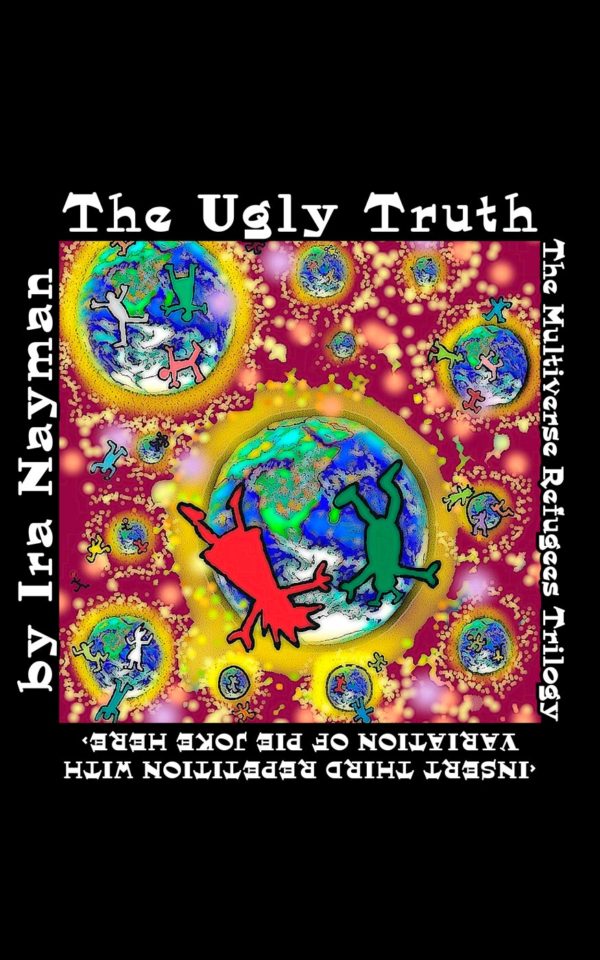
Welcome to my weekly Author Spotlight. I’ve asked a bunch of my author friends to answer a set of interview questions, and to share their latest work.
Giveaway: The first six commentors will get a free e-book copy of Futures in Mirror Are Closer Than They Appear.
Today: Ira Nayman is a humor writer who stumbled into speculative fiction over a decade ago and decided to hang about to see what would happen. His eighth novel, The Ugly Truth, will be published by Elsewhen Press in the summer of 2022. His 21st published short story, “Girls Rule the Steampunk World!” will appear in the next volume of Brave New Girls. In September, 2022, Les Pages Aux Folles, Ira’s web site of social and political satire, will celebrate 20 years of weekly updates, Ira was also the editor of Amazing Stories for three years. Yes, that Amazing Stories magazine.
Thanks so much, Ira, for joining me!
J. Scott Coatsworth: What does success mean to you?
Ira Nayman: I taught part-time in the new media program of a university in Toronto. I used to tell my students that the only reason to become an artist is because you love creating art. There are no guarantees of financial success (as I pointed out, Van Gogh only sold three paintings in his lifetime, two of them to his brother). There are no guarantees of popular success (Franz Kafka only sold a handful of short stories in his lifetime; if the executor of his estate hadn’t disobeyed his direct order, we may never have had such masterpieces as The Trial). You could work thirty or forty years of your life at your art and never achieve any of the traditional markers of success.
But…
…you would have done something you had loved for thirty or forty years of your life, and how many people can honestly say that?
Like most writers, I can sometimes get frustrated by my lack of popularity and/or financial success. Usually, all I have to do is look at the shelf on which I keep my publications (ever writer has one) to remind myself that I have spent my life doing what I loved. By that measure, I have been wildly successful.
JSC: What were your goals and intentions in this book, and how well do you feel you achieved them?
IN: The Ugly Truth: The Multiverse Refugees Trilogy: <INSERT THIRD REPETITION WITH VARIATION OF PIE JOKE HERE> is, as the title suggests, the final book in a trilogy. Trilogies have challenges of their own (the most difficult one being how to make the second book interesting in and of itself, because the problems have already been set in motion in the first book, but nothing can be resolved until the final book), but I managed to bypass a lot of them with a simple juke: unlike most, the trilogy does not contain a single storyline. Exactly.
Good Intentions, the first book in the trilogy, follows a single storyline: it relates the experience of a single refugee from a dying universe. Bad Actors, the second book, takes place two years later; it follows half a dozen different stories (including an update of the first character’s story). By introducing new characters and stories (which are in some ways resolved), it will hopefully be just as fresh and enjoyable as the first novel.
The Ugly Truth further fragments into dozens of shards of story (including Alternate Reality News Service articles about how the alien refugees are adjusting to life in various universes). Part of the overall plan for the books was to show how the experience of refugees becomes increasingly varied over time (as with much of my writing, form follows function). This third book is intended to bring a sense of closure to the refugee story, partially by resolving conflicts left open by the first two books, partially by reminding readers that we are all immigrants or descendants of immigrants, and therefore owe respect to those who follow us.
I think I have succeeded at the goals I have set for the trilogy, but ultimately it’s for readers to decide.
JSC: What’s the weirdest thing you’ve ever done in the name of research?
IN: I played a member of a race of aliens in a role-playing game for six months. The game was called Worlds Without Number; it was a science fiction RPG. At the point we started playing, I knew that I wanted to write a story about refugees (which eventually grew into a trilogy), and had done a lot of thinking about different aspects of the story (why they become refugees, who would help them, who would oppose them, etc.). Unfortunately, the one thing that was missing from my plans was the alien race that would become refugees!
In the game, I played Rodney, a four foot tall, hairless blue alien with exaggeratedly round features who wore an exquisite three piece suit. He had the ability to create things with his mind, using a battered old briefcase as the focus of his powers. He was also a trickster character: you never knew what crazy thing he would say or do. This often vexed the other players (as in the time when, in the middle of tense negotiations, he walked up to the leader of the other side and, taking a pie out of his briefcase, threw it in the man’s face).
Over the course of the game, I developed the alien’s culture, the history of its planet, its religion and even its sexual practices. By the time the game ended, I had a fully fleshed out alien race, with a lot more detail than I ended up using in the trilogy.
As a tribute to the origins of the alien race, the first character in the first novel of the trilogy to migrate out of his doomed universe was named Ridney. I mean, Rodney.
JSC: Who has been your favorite character to write and why?
IN: No! Seriously? You want me to choose my favourite child?
When I look back over what I have written, there are so many characters that I adore. Brenda Brundtland-Govanni, for example, the editrix-in-chief of the Alternate Reality News Service, who is always threatening to put on her slapping gloves to deal with errant writers. I wanted her to embody a quality that doesn’t get shown much in fiction: female rage. Or Joe and Bill, the Eternal Detectives, whose deadpan delivery of the most absurd lines I always find to be hilarious (any resemblance to characters from the original Dragnet is wholly intentional). Or the morphomorphs (literally: changing robots that change), perhaps the stupidest component of the robopocalypse (which endears them to me immensely).
If I had to focus on one, I would choose the tricksters (which, okay, will be more than one but just go with me on this). On the one hand, there is e-Pik Flayl, the trickster god in my pantheon of new media gods. On the other hand, there is the alien race of refugees in the trilogy I have just finished. The great thing about trickster figures is that, unlike most characters, who are constrained in their range of actions by their natures, tricksters can be completely unpredictable. There are times when I would ask one of my alien tricksters to do something crazy, and they would respond, “You want crazy? That’s nothing. Let me show you what crazy really is!” The unexpected is a key component of a lot of comedy; I love trickster characters who can deliver it.
JSC: You have been traditionally published. Why do you continue to self-publish?
The template for a career in publishing is to self-publish until you have a critical mass of readers and/or have progressed enough in your craft that you can get traditionally published, at which point you no longer need to self-publish. This path has certainly worked for a lot of writers, and more power to them. However, I have been traditionally published for about 10 years, now, and continue to self-publish. Why?
The short answer to the question is that nobody wants to publish the things I write for my web site, so I have to do it myself if I want to keep doing that writing. And there are a lot of good reasons for wanting to continue doing that writing. One is that I have the complete freedom to write whatever I want to without regard to what markets (or editors) want. That freedom, aside from being a joy in and of itself, is important because it allows me to experiment; a lot of the style and substance of my novels and short stories was first worked out on Les Pages aux Folles.
Another is that writing to a weekly deadline is an important discipline. The insatiable maw must be fed. Writing Les Pages aux Folles has taught me how to develop and fully flesh out ideas very quickly, and how to let go of individual pieces when they are reasonably completed rather than aiming for perfection. If I stopped writing for it, I may make more time for traditional writing, but I may also lose that discipline, which would make writing much harder. (I also don’t find any conflict between the two when it comes to the use of my time: I have been able to write ten novels and three dozen short stories, not all of which have been published, at the same time as I was writing for my web site.)
Finally, it gives me immediate personal satisfaction. Writing has always been such an important aspect of my life, the more I do it, the happier I am. (To the extent that I can be happy, but, uhh, that is a discussion for me and my therapist.) I also must admit that I enjoy self-publishing, both on my web site and in print; I enjoy the process of preparing material for my web site and for publication in print and ebook formats.
It may not be for everybody, but a hybrid self- and traditional publishing career works for me.
JSC: How do you approach covers for your indie self-published books?
IN: Before I get into specifics, I have an observation about covers and some context.
THE OBSERVATION: What passes for “good” cover design is almost always something professional that gives the reader a clear idea of what genre the book is in. Science fiction covers, for example, often have alien worlds and/or spaceships. Romance covers almost always have beefy guys smoldering at the reader. And so on. I have no problem with professional looking covers. The problem with this approach, though, is that most books in a genre start to look the same (especially since many publishers use the same artist or small pool of artists), which means that no book stands out on store shelves or when somebody is scrolling through books in the genre online.
My belief has always been that the cover is the introduction of your book to the reader, and, therefore, must be distinctive. Creating covers for my books that stand out from the rest has, therefore, been my guiding principle. It helps that my self-published books are, in and of themselves, unique.
THE CONTEXT: Uhh, yeah, so, about that. The self-published books for which I have designed covers (as opposed to my novels, which were published by an honest-to-goodness publisher to whom I am not related) feature writing from the Alternate Reality News Service (ARNS), which sends reporters into other realities and has them report back on what they find there. It has been described by one reader as “a science fiction version of The Onion.” During the Trump administration, I thought of it as the original fake news. The point is, the books aren’t narrative fiction. Each contains 80 pieces of humorous “journalism.”
Of the 12 original collections in the series, five contain news, reviews, interviews and anything else you might find in your daily newspaper (including obituaries, because people in other universes die, too). Two of the books contain humorous science fiction advice columns. Five of the books are reports from a universe where the United States of Vesampucceri is the world’s leading idiotocracy, which, as you might guess, is rule by the stupidest people. There are also two omnibus volumes that contain the complete text of two or three idiotocracy books.
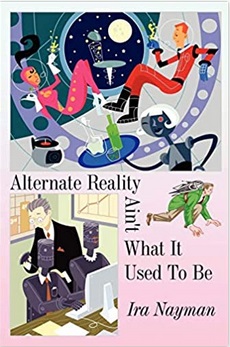
So. Having set the table, I can now say that I take two approaches to designing the covers for my ARNS books. In the first, the cover represents the content. That was the case with the first book in the series, Alternate Reality Ain’t What It Used To Be. The title, taken from one of the articles in the book, inspired a retro look, so I suggested some scenarios from the 1950s and 1960s that imagined the future we’re now living in (and which obviously did not come to pass – still waiting for my jet pack, people!). As you can see, the artist chose three of them.
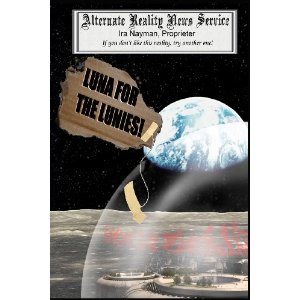
Another example was the cover for the third book in the series, Luna for the Lunies! The title once again came from an article in the collection. The cover depicts a colony on the moon, with the title scrawled on a piece of paper that is stuck to the outside of the dome with transparent tape. The effect is hopefully a clash of high and low tech.
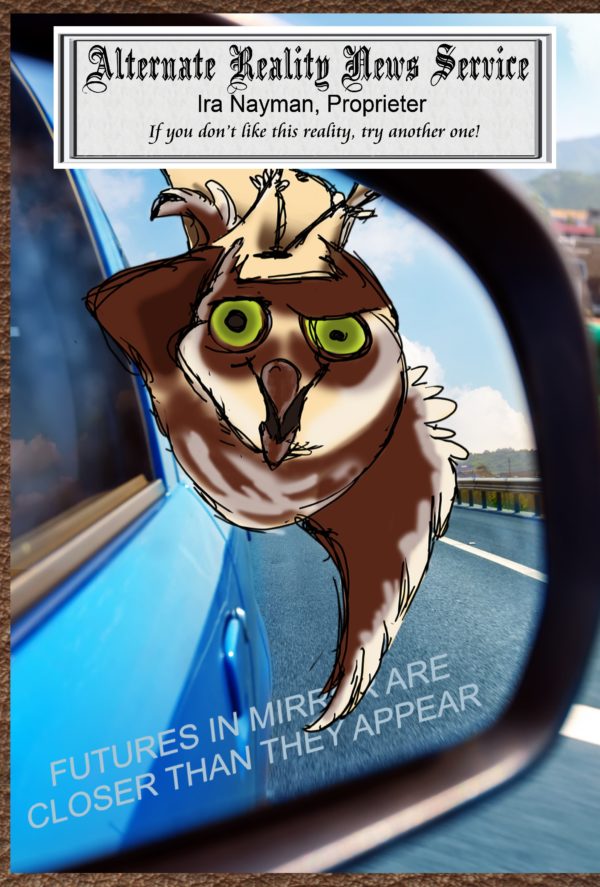
I have also developed covers based on images that blew me away, images that I adored so much I just knew I had to find a use for them somewhere. Take the cover for the fifth book in the series, Futures In Mirror Are Closer Than They Appear. A friend and colleague of mine, Liz Hurst, had drawn an image of a crazed bird that I fell in love with the first time I saw it. At the time, I didn’t have an idea of what I could use it for, just that I wanted to use it somehow. Eventually, I conceived the idea that you wouldn’t want to see this thing gaining on you in your rearview mirror! (This was not the first time I had combined a drawing with a photograph on the cover of a book, but that’s a discussion for another occasion.) My Web Goddess Gisela McKay took the elements and designed the cover.
The title of the collection was inspired by the image rather than the other way around. Unlike a lot of book covers, the title does not stand apart from the illustration but, in parodying the usual text on a car mirror, it is an integral part of the illustration.
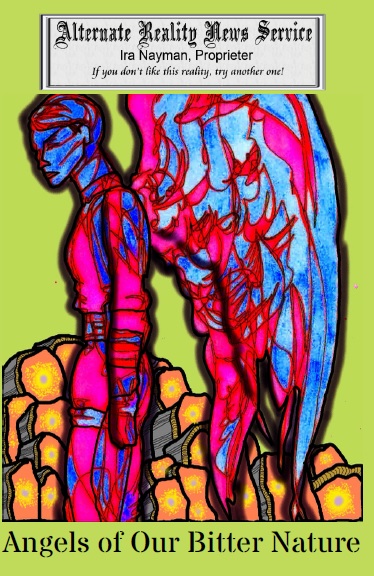
Four of the five Vesampucceri book covers went through a similar creative process. Another friend and colleague of mine, Hugh A. D. Spencer, has created unique illustrations that I am rather taken with. For the second book (the ninth in the series overall), I was struck by the strange beauty of an angel that he had created, an image that inspired the title Angels of Our Bitter Nature.
The fourth Vesampucceri book (eleventh overall) was something else. After two and a half years of satirizing the Trump administration, I was really hoping to get back to writing more general Alternate Reality News service collections. I had over a dozen general articles that I had held back to do the Vesampucceri books, articles that could kickstart a new collection. However, the Republicans continued to be more and more outrageous, so I continued to pump out Vesampucceri articles. To show how this worked, this book started off as a general collection that was then “interrupted” by the fourth Vesampucceri book. (Because of this, it is the only ARNS book that contains more than the usual eighty articles.)
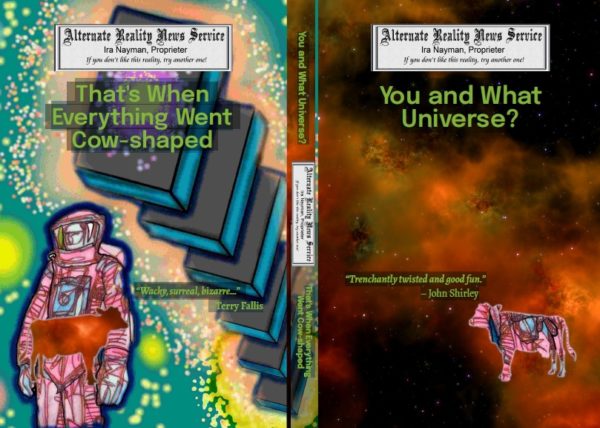
To reflect that there were two books warring for the reader’s attention inside, this volume has two covers. The one on the front, You and What Universe?, representing the aborted volume, is essentially a star field. The one on the back, That’s When Everything Went Cow-shaped, is based on a graphic by Hugh of an astronaut in front of a series of squares which could be books or monoliths against a cartoon star field. On both covers is the shape of a cow which shows a piece of the other cover; this is supposed to unify the two covers. I leave it to the reader to decide if it worked or not. Again, as she did with most of the other Vesampucceri books, Gisela designed and executed the cover.
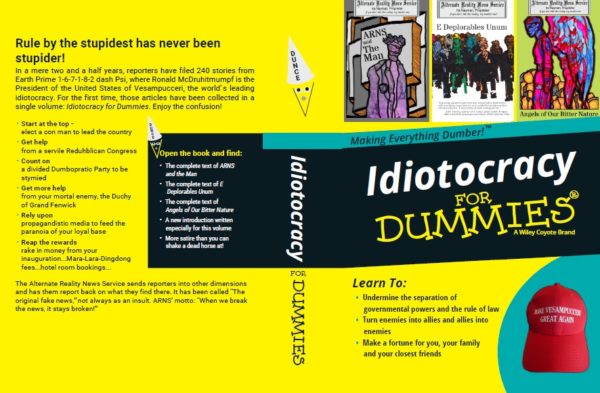
I should also mention that, when I thought I was finished with the third Vesampucceri book, I released an omnibus volume containing all three books called Idiotocracy for Dummies. Gisela designed a perfect parody of a “For Dummies…” book for the cover. Once I had settled on the concept, the cover pretty much designed itself. When, despite myself, I wrote two additional Vesampucceri books, they were released in their own omnibus volume with the inevitable title Advanced Idiotocracy for Dummies.
One final note on this subject: the cover of the second book, What Were Once Miracles Are Now Children’s Toys, was meant to look like a newspaper cover, including a masthead. After it came out, I asked the artist I was working with to create a masthead that included the name of the organization and its motto, “If you don’t like this reality, try another one!” That masthead appears on the covers of all of the books in the series (except the first one, for technical reasons I won’t bore you with). In this way, it visually ties all of the books together, as well as differentiating them from the other books I have written.
JSC: What was the most valuable piece of advice you’ve had from an editor?
IN: The most valuable piece of advice I have ever received about writing came not from an editor, but from the head of the film department at York University, where I got my undergraduate degree.
It was for the fourth year screenwriting course. I wasn’t a screenwriting major; in fact, I wasn’t even a film major. My degree was in Interdisciplinary Fine Arts. I applied to get into the first level of screenwriting (a second year course), and was admitted on the strength of my script portfolio. That course had 80 students. I got into the next level of screenwriting, which had only 40 students. In my last year at York, I got into the fourth and final level of screenwriting, which had only 20 students. Go me.
The assignments were straightforward: write two master scene treatments (basically: screenplays without dialogue), then use one of those as the basis for a full feature-length screenplay. I was given an A on the screenplay, which earned me an A in the class, which was something of a surprise to the professor, since, not being a film student, he had no idea who I was.
In the meeting where we discussed my work, the course and screenwriting in general, the prof (who was the head of the film program) told me that I had a tendency to be too jokey, that I ran the risk of all of the characters sounding the same if I they all spouted one-liners. He suggested that I give my characters comic traits, and allow the humor to arise out of their responses to situations and interactions with each other.
That advice opened up a whole new perspective on comic storytelling for me.
JSC: How would you describe your writing style/genre?
IN: Aggressive surrealism.
Two of my early comedy heroes were the Marx Brothers and Monty Python’s Flying Circus. From both groups, I learned the two vs that make up my comedy style: velocity and variety.
VELOCITY: Most humour proceeds at a stately pace, with the jokes appearing at measured intervals. Screw that action! With my writing, humorous effects often jump all over each other to see which will get to the reader first. My sentences are crammed with comedy; sometimes two or three jokes appear in a single sentence. (One of my favourite criticisms of my writing came from a reviewer who wrote:: “And his sentences are too long.”)
VARIETY: Most humour writers focus on one or a small number of comic devices. You can do that when your humour is measured, because each individual joke will seem fresh. However, a fundamental aspect of humour is surprise: the reader shouldn’t see the joke coming (although, paradoxically, when it does come, the reader should be able to understand the logic of it, or the response will be confusion rather than laughter). When the pace of humour in a work is accelerated, you run the risk of the reader catching up with your comic sensibility, which can make it harder to surprise her.
For this reason, it is necessary to mix up the types of humour you use. The Marx brothers, for example, had Groucho’s aggressive humour, Chico’s malaproprisms and Harpo’s physical humour. Python mixed the most sophisticated forms of humour with the crudest, and everything in between. I use all of the comic devices at my disposal to keep my readers off guard and, hopefully, laughing.
It is unlikely that every reader will get every joke in my books (feel free to take this as a challenge), especially since I’m not above throwing in the occasional joke for my own pleasure that may only be appreciated by a handful of people. However, one of the advantages of writing with a high volume of jokes is that readers need only appreciate seventy or eighty per cent of the humour to enjoy one of my books. Those readers are my target audience.
JSC: What is the most heartfelt thing a reader has said to you?
IN: I answered this question one way in my interview with you a couple of years ago. I’m going to give you a different answer now, mostly by cheating and telling you a story about something heartfelt my editor once said to me.
When I started sending the Alternate Reality News Service books out for review, the most common response I got was to be compared to Douglas Adams (almost always favourably). While flattering (I’m a fan of his work, too), I generally downplayed the comparison. Why? Because my style of humour is very different than that of Adams, and I didn’t want readers picking up one of my books thinking they would be getting another Hitchhiker’s Guide to the Galaxy, and being disappointed by getting, well, me.
I mentioned this to Peter Buck, the publisher at Elsewhen Press, when we were editing my first novel, Welcome to the Multiverse (Sorry for the Inconvenience). Peter, who is British, responded, “A good friend of mine worked with Douglas towards the end of his life, and I got to know him a little bit. Of all of the people I have come across who write humorous science fiction since Douglas died, you are the one who comes the closest to taking up his mantle.”
Peter has published eight of my novels, so I assume he was sincere!
JSC: What are you working on now, and what’s coming out next? Tell us about it!
IN: The last couple of years have been extremely stressful for me. In addition to the COVID lockdowns and mandates that everybody has had to deal with, I’ve had to accept that the love of my life for decades was a narcissistic sociopath who was incapable of loving me back, and to deal with my fathers descent into late stage Alzheimer’s (I was one of a pair of people who had to watch him from 9pm to 5am for months; the disruption to my sleep didn’t help).
As a result, I haven’t been able to write any appreciable narrative fiction for at least six months. 🙁 I have continued to write articles for Les Pages aux Folles, my web site of social and political satire, but I haven’t been able to concentrate on short stories or my next novel.
Until last week (as I write this), when I wrote a short story in response to a call for submissions I came across on the net. The story was only 1,700 words long (the limit was 2,000), but it was one of those that I think of as “cleaning out the pipes:” I threw a bunch of zaniness together just to get the creative juices flowing. If it worked, I have a couple of short stories I would like to write. In addition, I hope to get back to the novel I have started, Fraidy’s Amazeballs Alternaut Academy. It is a sequel to my first Young Adult novel, Fraidy’s Amazeballs ARggles Adventure (for which I am still looking for a publisher – nudge, nudge).
That doesn’t mean I don’t have anything to look forward to. The Ugly Truth, my eighth novel, will be coming out in July, 2022. And my first steampunk story, and first published YA story, “Girls Rule the Steampunk World!” will be published in the anthology Brave New Girls: Chronicles of Misses and Machines. I am over the moon about this sale. Brave New Girls is a series of YA science fiction anthologies that feature girls and young women who solve problems using one of the STEM areas of knowledge; the proceeds of each book go to funds supporting girls in pursuing STEM research. I’ve had short stories in a lot of anthologies I’m proud of, but this is one of the most exciting for me.
The creative lull also doesn’t mean that I haven’t been busy doing writerly stuff. In the first week of September, 2022, Les Pages aux Folles will be twenty years old. That means I have produced 1,040 consecutive weekly updates, which, I believe, makes mine the longest running regularly produced satirical web site created by a single person on the Internet. (Okay, that’s a lot of qualifiers, but still.) To give you some perspective on this achievement: studies have shown that most blogs are abandoned by their creators within six months. To give you some additional perspective on this achievement: by the time of the anniversary, Les Pages aux Folles will contain approximately 3,700 pieces of writing, divided into 38 books of prose (including the 12 Alternate Reality News Service books, all of which started life on the site), made up of somewhere between two and quarter and two and a half million words.
That’s dedication.
To celebrate the 20th anniversary of Les Pages aux Folles, I have spent the last few months going through the web site to pick out best articles, which I have put together into a project called “12 From 20.” Starting in September, I will be releasing one ebook a month; each will look at a different feature of the web site. They include: All the Internet’s My Playground (the Daily Me, a compendium of bits of news based on an idea by Nicholas Negroponte); Alternate Reality Ain’t What It Used To Be (the first seven collections of Alternate Reality News Service articles); Hair of the Doggerel That Bit You (poetry); and Common Sense Meets the Common Moron (a general collection of articles that didn’t fit in any of the other collections). Each collection begins with an introduction discussing the evolution of the feature and concludes with “The Back Story,” which outlines the history of Les Pages aux Folles. The ebooks will be available through online bookstores and my web site.
So, while it has been a depressing time for me, I have kept busy and I do have a lot to look forward to. 🙂
And now for Ira’s new book: The Ugly Truth: The Multiverse Refugees Trilogy: < INSERT THIRD REPETITION WITH VARIATION OF PIE JOKE HERE>
Four years after their universe was identified as being about to collapse, the largest migration in multiverse history continues. How many will be saved, and how will they integrate into their various new homes?
Get It At Amazon
Excerpt
It was a cold, wet, grey day in Vancouver. There was a board in the West End – Coal Harbour Community Policing Centre squad room that read: ‘DAYS WITHOUT SUN’. Somebody had chalked in ‘17’. Most of the cops who worked there had forgotten the circumstances under which the sign had been erected (Joe [LAST NAME TO BE DETERMINED] and Bill [GIMME A MINUTE AND I’LL LOOK THAT UP] knew, but nobody thought to ask them); somebody must have been enthusiastic to keep track at some point, but nobody who had worked in the precinct for more than a month shared that enthusiasm. Nobody knew who kept the daily tally up (except for Joe and Bill, but they slipped out of your consciousness before your conversation with them was over). Years ago, somebody had chalked out the final ‘U’ and replaced it with an ‘I’.
The Pizzicotti triple homicide put an end to that frivolity. The weather didn’t bother Joe or Bill. It wasn’t that they were immune to the wind and the rain; it was that weather had enough respect for them to give them a wide berth. In return, Joe and Bill wore wide-brimmed fedoras and trenchcoats in acknowledgement that weather could affect them if it chose to, and thanks that it chose not to.
Joe and Bill, the Eternal Detectives, went where they were needed. While they were there, it was like they had always been there; when they were gone, their triumphs were quickly forgotten. Everybody at the West End – Coal Harbour Community Policing Centre, where they worked the case in Vancouver, knew they had always been there on the edge of retirement, staying on for just one more case. One more case. One. More. Case. Nobody was willing to begrudge Joe and Bill staying on since they had a perfect clearance rate: they solved every case they investigated. Some of the less charitable detectives in the Coal Harbour precinct hoped that the one more case would be the one that they couldn’t solve; some of that some thought that the defeat would cause them to disappear in a puff of smoke. Most of the men and women in the Policing Centre, though, were grateful for the Eternal Detectives, because their perfect record made the whole squad look good.
There was no colour to Joe and Bill, who appeared in shades of grey, as if they had watched too much television in the 1950s and it bled into their appearance. They wore standard issue Eternal Detective black pants, white shirt and rumpled jackets.
Bill drove their black and white beater (it wasn’t, like them, drained of colour; that was just the pattern in the long ago days when the vehicle had been assigned to them) up to a large container on a dock in Vancouver. Vancouver is Canada’s largest and most diversified Port, and the largest export port in North America. The Port of Vancouver includes more than 16,000 hectares of water, more than 1,500 hectares of land and hundreds of kilometres of shoreline, bordering 16 municipalities and intersecting the traditional territories and treaty lands of several Coast Salish First Nations. I’m not saying this because I Googled it – it’s common knowledge throughout Canada.
The manifest said the container was transporting Canadian flags, Canadian flag lapel pins, Canadian flag tshirts in red, Canadian flag fridge magnets, Canadian flag flying over Vancouver fridge magnets, Canadian flag tshirts in white and a baby’s arm with a tattoo of a Canadian flag holding an apple. The manifest lied. What the container actually transported was horror.
“This crime was obviously perpetrated by patriots, Joe.”
“How do you figure, Bill?”
“The manifest could have said this was a shipment of
American flags. Or China from France. Or French fries from China. Anything, really. Whoever forged the manifest made it very Canadian – the only thing missing was fridge magnets of beavers and maple syrup.”
“Not necessarily. The perps could have figured that nobody in Vancouver would inspect a cargo container that claimed to hold so much Canadiana. To even think of doing so would be unpatriotic.”
“If they didn’t want the container to be inspected, they shouldn’t have left it on the dock for three weeks. A little thing like that attracts attention.”
“Patriotism has its limits, Bill. It has its limits.”
Bill cut the engine and the car hiccoughed to a halt; he had long ago accepted that there were no medications for what ailed this vehicle and chalked it up to ‘character’.
He and Joe got out and walked up to the container.
Next to it stood a tall man with a face so hangdog you could be forgiven for thinking that he stretched it on a gallows every morning before breakfast. He was the Vancouver coroner. His name was Sanzio or Buonarroti or Betto Bardi or…or…or something classical like that. A plume of smoke followed the man around like a puppy; he appeared to be smoking three cigarettes at once, none of which were inconvenienced in the slightest by the rain. There was no mistaking the gratitude on his face when he saw the two detectives walk up to him.
“Evening Joe,” he greeted them. “Evening Bill.”
“Evening, Dominic,” Joe returned the greeting. “What have we got?”
“You’re gonna wanna see it for yourselves,” the coroner told them, lighting a fourth cigarette as two of the original three burned down to stubs (without in any way affecting his lips – how did he do that?). “I’ve been at this job for seven seasons, and I’ve never seen anything like it.”
Bill and Joe shared a look. “Do we wanna ask, Joe?” “Let the man have his angst in peace, Bill.” “He does look like he has earned it.” “You see a lot of the worst of human nature in seven seasons as a coroner.” “If his face was any more hangdog, it would be the pet version of a word guessing game.”
When you’ve been partners as long as these two had, your looks speak volumes.
“Yeah, I appreciate an expressive look between longtime partners as much as the next guy,” the coroner cut in, “but it’s two in the morning and there are a lot of bodies to process. The sooner I can do that, the sooner I can get home and perfect my hangdog look in the mirror while I’m sleeping.”
With a nod of acknowledgement, Joe led Bill into the cargo container.
“Well, if that don’t beat all.”
“All, Joe?”
“All, Bill.”
“A pair of deuces, Joe?”
“My grandmother could beat a pair of deuces, Bill, and
she’s been dead for almost thirty years!”
“I take your point.”
“It was a good one.”
“A full house, tens over sevens?”
“It could beat a full house, aces over kings.”
“A straight flush?”
“It could beat a straight flush.”
“A royal flush?”
“It could beat a royal flush.”
“What could beat a royal flush Joe?”
“Grace, Bill. Grace.”
Bill frowned, as if Grace was a new concept to him. It didn’t figure into the Friday night poker games he would have played if he wasn’t wedded to the job. It hadn’t figured into his marriage (which had, despite the empty hole where Grace should have been, managed to survive 33 years). It didn’t figure into the pulp western novels that he enjoyed reading, except on those rare occasions when the school marm’s name was Grace. Still, he was the junior detective here, and had a lot to learn about detecting.
The cargo container held bodies. Dozens of four foot tall bodies with no hair and balloonish heads and limbs. Even in death, their three piece suits were exquisite.
“Where’s the blood?”
“Blood, Bill?”
“This much death, you expect to see a lot of blood, Joe. If nothing else, it adds a little colour to a crime scene.”
“If I didn’t know you better, I’d worry about you, partner.”
“’Preciate it.”
Moving around the container, Joe and Bill couldn’t help but notice that there were no signs of violence. This left only one conclusion as to the cause of death, which the detectives came upon at the same time: asphyxiation.
“Isn’t it ironic, Joe? Don’t you think?”
“What’s that, Bill?”
“They came from a universe where they didn’t have to breath, only to die in an alien universe because they couldn’t breath.”
“You have the soul of a poet, Bill.”
“The soul of a poet is necessary to be a good detective, Joe. You have to have it issued with your kevlar vest and pepper spray.”
“I don’t remember filling out the requisition form for the soul of a poet, Bill.”
“It was right under ‘snub-nosed revolver’, Joe. Easy to check off without even realizing you were doing it.”
“Mmm…” Joe looked around the container hungrily, like clues were his sustenance and the restaurant was out of just about everything. After a while, his hum changed from absent thoughtfulness to thoughtful thoughtfulness.
“Say, Bill, do you notice anything about the bodies?”
“Other than being dead, you mean, Joe?”
“Something unusual.”
“I wouldn’t think that being dead was usual for them.”
“Something about the positioning of the bodies.”
Bill peered at the bodies in front of him. Although the moon was obscured by rainclouds, the dock was lit better than a football field, so the peering was mostly for effect. One of the bodies was sitting on its ass, its arms and legs curved upwards. “Now that you mention it, there is something…different about – is that corpse making a letter?”
“I’ll take observation skills over poetry any day. Yes. I think that’s a letter.”
“U?”
“I could ask, ‘Me what?’ But that would just be silly.
Yes. The letter u.”
The next body sat with its legs out to the side and its arms held straight up over its head. “L…” The body next to that stood, its elbows behind it and its arms straight ahead. “T…” The body next to that stood at attention, holding a bowler hat high above its head. “I…” The next body was on its ass again, its arms and legs straight out at a ninety degree angle. “Another u?”
“I think you’ll find that’s a v.”
“Ultiv…erse. What’s an ultiverse?”
“I think you may find that you started in the middle of the word.”
Bill and Joe walked around the cargo container, tracing the letters the bodies made back to the beginning of the message. There were forty-one corpses in total, spelling out: “W-e-l-c-o-m-e T-o T-h-e M-u-l-t-i-v-e-r-s-e S-o-r-e-y F-o-r T-h-e I…”
Bill shook his head. “What does it mean, Joe?”
“It means that the aliens were true to themselves to the very end, Bill.”
“What does being true to yourself mean if you’re an alien?”
“Goofy.”

